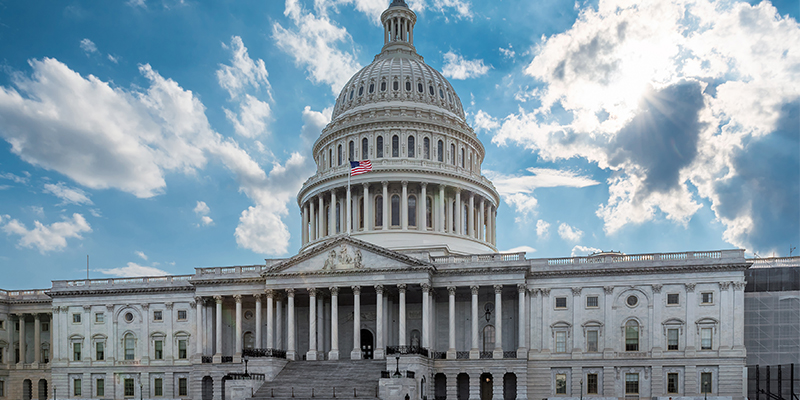For the first December in recent years, Congress is no longer facing a government shutdown deadline. Prior to the Thanksgiving recess, Congress approved a two-tiered appropriations package. This “laddered” approach primarily funds domestic programs (such as housing, agriculture, transportation and infrastructure) until Jan. 19, 2024, and the remaining programs, including defense and homeland security, until Feb. 2, 2024. Year-end 2023 is not without its share of must-pass legislation, however.
Before Congress adjourns for the holidays, House Speaker Mike Johnson (R-LA) must convince his conference to approve the $886 billion National Defense Authorization Act, reauthorizing legislation for the Federal Aviation Administration (FAA), and Section 702 of the Foreign Intelligence Surveillance Act (FISA). In addition, the House must reach an agreement with the Senate and President Joe Biden on aid packages for Ukraine, Israel and Taiwan that House and Senate Republicans say must include border security funding. With six legislative days left on the schedule, the House appears to be adding to their busy schedule by approving impeachment inquiries for Biden and Homeland Security Secretary Alejandro Mayorkas.
Adding to Johnson’s challenges, the House voted 311-114 last week to expel Representative George Santos (R-NY), making him the sixth member in history to be expelled from Congress and shrinking the already narrow and fractured Republican majority in the body.
Of interest to commercial real estate is the potential for agreement between House Ways and Means Chairman Jason Smith (R-MO) and Senate Finance Committee Chairman Ron Wyden (D-OR) on a bipartisan tax package. This could include measures on bonus depreciation, business interest deductibility, and research and development tax credits, as well as an increase in the child tax credit for low-income families, and could be included in the FAA reauthorization mentioned above. The chances for a year-end tax deal are diminishing given the current partisan atmosphere in the House, limited time and disagreements over other funding issues. Nevertheless, NAIOP’s Government Affairs team is encouraging policymakers to include a proposal for the cancellation of tax liabilities for property owners who receive debt forgiveness from commercial real estate loan restructurings, as well as a tax credit for converting older office and other commercial buildings to affordable housing, in case a year-end tax package becomes viable.
Potentially complicating future tax legislation is the eventual ruling in the case of Moore v. U.S. In the case, a Washington State couple is challenging a provision in the 2017 Tax Cuts and Jobs Act, which charged a one-time tax on profits held outside of the United States. The couple is seeking a $14,729 refund on taxes they were charged for an investment in an India-based company, KisanKraft, which, although it has realized a profit every year of its existence, has reinvested those funds into the business rather than distribute earnings to its shareholders. The question of the case is fairly simple: Must income be received before it is considered taxable income?
If the Moores win the case, the federal government could owe billions of dollars in refunds. If they lose, it strengthens Wyden’s argument; the senator introduced legislation to tax the unrealized capital gains of those with assets over $1 billion and those with incomes of $100 million or more for three consecutive years. The legislation, dubbed the “billionaires’ income tax,” is cosponsored by 15 Senate Democrats, and would impose the tax on the appreciation of assets, regardless of whether those assets are sold.
The Supreme Court’s decision and opinion on Moore will be released next year. While Wyden’s legislation has little chance of passing the House of Representatives, where Republicans who oppose wealth taxes are in the majority, it would help Democrats highlight the issue of income inequality, an issue they plan to focus on in 2024 election campaigns, and which will be a major issue in the 2024 presidential campaign.
When Congress returns on Jan. 3, it will need to begin work on reaching agreements on the 12 annual appropriations bills for Fiscal Year 2024. To date, the House has approved seven appropriations bills, and the Senate has approved three. One previous sticking point was the top line funding number of $1.59 trillion in the debt ceiling agreement approved last May. Until last Thursday, conservative hardliners in the House were demanding a top-line number of $1.471 trillion, but appear to have conceded to the higher number. The agreement on the $1.59 trillion number will allow the negotiations to focus on primarily on “policy riders.” Because both the House and the Senate have approved versions of the appropriation bills set to expire on Jan. 19 (Agriculture, Energy-Water, Military Construction-VA, and Transportation-HUD), an agreement appears to be more attainable, giving negotiators in both chambers more time to focus on the more controversial bills set to expire on Feb. 2.








